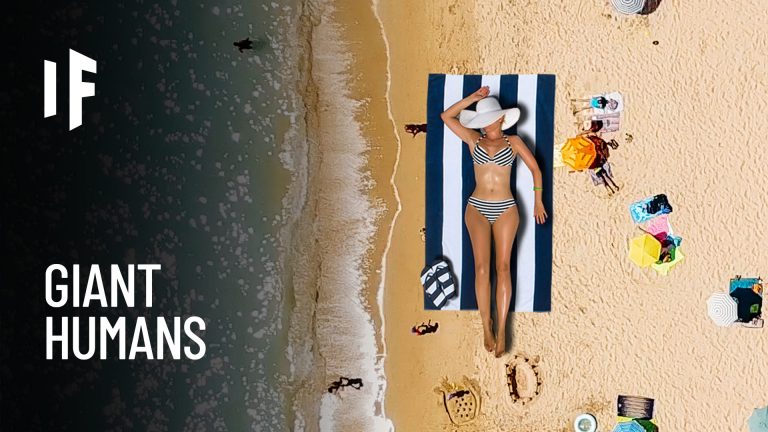We all know that growing up can come with its aches and pains. But at a certain point, our genes flip the switch, and our bodies stop growing. I know, I know, it’s just not fair!
What if growing never actually stopped? Could we survive as giants? How large could a human body be? What animals never stop growing? And could Earth support a population of giant humans?
Growth is determined by several factors, like our DNA, hormones, and even our diets. If you have tiny parents, well, unfortunately, based on your genetic predisposition, you will be too. Don’t worry. It doesn’t mean you still can’t be a professional basketball player.
When you’re born, 80% of your height and 70 to 80% of your weight is predetermined by your genes. So when exactly are we done growing?
While men and women grow at different rates, they both tend to max out at a certain age, typically between 18 to 24 years old. This is primarily due to genetics, but also our hormones.
Genes serve as a blueprint for our size. And our hormones are like the engines that help our bodies grow. The pituitary growth hormone and the thyroid hormone regulate the rate of growth and your metabolism. Sex hormones determine when puberty hits, and you start to notice funny changes, like your voice getting deeper.
Getting a good night’s sleep is also a factor. Sleep releases growth hormones and helps your body recover. Exercise and diet will influence how much muscle mass you build and reduce how much fat your body retains. So, if you’re self-conscious about your height or weight, you still have options to look bigger or smaller. Or there’s always high heels, tall hats, or stilts.
So what is it that makes some humans 2.5 m (8 ft) tall? According to Guinness World Records, the tallest living man is Sultan Kosen, a 31-year-old Turkish farmer who is 2.52 m (8′ 2″ and 13/16″) tall. His grandiose stature results from a benign tumor affecting his pituitary gland, producing a condition known as gigantism.
People with gigantism have an over-secretion of growth hormones and grow faster than average. So if we managed to hack our genetics to never stop growing, how big could we get before crippling under our own weight?
Well, before you get too excited and move into a giant house, your larger-than-life growth could come with a higher price to pay than a new mortgage. According to the square-cube law, an object’s volume will always grow faster than its surface area. So, if our bodies never stopped growing, don’t expect to be tall and skinny like a supermodel.
Unfortunately, you would also grow wider. This is because of an increase in volume.
At a certain point, our bones would not be strong enough to support our weight due to the immense pull of gravity. That is why monsters like Godzilla and King Kong couldn’t exist in reality. Sorry to burst your nerdy bubble!
Eventually, we’d start to look more like human blobs due to our proportionate increase in volume. Unfortunately, with more cells in our body comes a higher risk of mutations or diseases like cancer.
Our hearts would be under constant strain, trying to pump blood throughout our whole body. And by the age of 30, you would have difficulty standing up. You would need a hearty diet to keep your muscles healthy.
But stronger muscles wouldn’t necessarily be your saving grace. Too much muscle could lead to your body caving in on itself with all the added weight. Around the age of 45 to 50, you would likely develop cancer or heart disease due to the stress on your body. You’d have a more challenging time regulating heat and would need some heavy-duty air conditioning to stop your body from overheating.
If you made it to the age of 70, you might reach a height of 2.7 m (9 ft). But good luck standing up. You would need a support system to keep your bones from crushing under your weight, like a hover chair. Hmm, where can I get me one of those!
The most massive mammal alive today, the blue whale, can grow up to 172,000 kg (190 tons) thanks to its buoyant environment underwater. Some animals, like certain crustaceans, insects, and reptiles, have indeterminate growth. They can regenerate limbs or body parts and can vary significantly in size based on their environments.
While some larger animals, like elephants, have longer life spans, this isn’t always the case. The largest members of each species tend to live shorter lives due to health complications.
Sources
- “What factors influence a person’s height?”. 2020. medicalnewstoday.com.
- “Why Do Big Animals Die Younger?”. P. D. Mangan. 2017. Medium.
- “Body size, energy metabolism and lifespan”. John R. Speakman. jeb.biologists.org.
- “Tall people do live SHORTER lives – and now scientists can tell us why”. Hamza Jabir. mirror.co.uk.
- “Tall people have greater cancer risk – and growth hormones could be to blame”. Gregory, Andrew. 2015. Mirror.
- “Can Diet Affect Height?”. 2009. Westchester Magazine.
- “DNA Vs. Diet | Understanding Genetics”. 2020. genetics.thetech.org.
- “Why people become overweight”. Harvard Health.


















